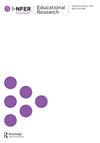工作综合学习(WIL)主流化:从业者的身份
IF 2.6
3区 教育学
Q1 EDUCATION & EDUCATIONAL RESEARCH
引用次数: 2
摘要
背景:为了提高毕业生的就业能力,高等教育面临着越来越大的挑战,通过政策和实践,将工作整合学习(WIL)作为大学教育的主流组成部分。然而,很少有人关注学术领域的WIL实践者,他们的身份(个人-专业)与当前的WIL角色和实践密切相关。目的:本文报告了一项小规模定性研究的结果,该研究旨在调查澳大利亚一所大学学术工作者的身份。该研究的目的是在大学工作整合学习经历快速变化的时候,对从业者的身份有更深入的了解。方法:对6名学术工作者进行访谈。每个人都接受了“双重访谈法”的采访,作为深入了解WIL实践的一种方式。深入的数据分析涉及在可能自我理论框架内的内容分析方法,以捕捉个体从业者的身份信念。结果:框架内的分析使从业者的学术身份得以显现,数据反映了他们的希望、恐惧和挑战。它还强调了他们所做的判断,并深入了解了从业者的工作自我概念和身份。分析揭示了一系列可能的自我,这些自我在一段时间内不断进化,受到不断变化的自我认识的影响。结论:这项小规模调查的结果引起了人们对学术工作者在塑造当前和未来的WIL实践中所起的重要作用的关注,以及该领域进一步研究的必要性。这对高等教育中WIL实践的可转移性和维护以及WIL成为主流的真实性都有影响。本文章由计算机程序翻译,如有差异,请以英文原文为准。
Work Integrated Learning (WIL) mainstreamed: the identity of the practitioner
ABSTRACT Background: With the aim of augmenting graduate employability outcomes, higher education is increasingly challenged, via policy and practice, to increase Work Integrated Learning (WIL) as a mainstream component of university education. However, little attention has been given to the academic WIL practitioner, whose identity (personal – professional) is closely tied to current WIL roles and practices. Purpose: This article reports on the findings from a small-scale qualitative study that sought to investigate the identities of academic WIL practitioners at an Australian university. The study’s purpose was to gain a deeper understanding of the practitioners’ identities, at a time when universities are undergoing rapid changes in work integrated learning. Methods: Interviews were held with six academic WIL practitioners. Each was interviewed using the ‘interview to the double method’ as a way of gaining insight into WIL practices. In-depth data analysis involved a content analysis approach within a framework informed by possible selves theory, in order to capture individual practitioners’ identity beliefs. Findings: Analysis within the framework allowed the academic WIL identities of the practitioners to emerge, with the data reflecting representations of their hopes, fears and challenges. It also highlighted the judgements they were making, with insight gained into the practitioners’ working self-concept and identity. The analysis revealed a range of possible selves that continually evolve throughout a timespan influenced by shifting self-knowledge. Conclusions: Findings from this small-scale investigation draw attention to the important role academic WIL practitioners play in shaping current and future WIL practices, and the need for further research in this area. There are implications for the transferability and maintenance of WIL practices in higher education and the authenticity of WIL as it becomes mainstream.
求助全文
通过发布文献求助,成功后即可免费获取论文全文。
去求助
来源期刊

Educational Research
EDUCATION & EDUCATIONAL RESEARCH-
CiteScore
4.00
自引率
2.90%
发文量
0
期刊介绍:
Educational Research, the journal of the National Foundation for Educational Research (NFER), was established in 1958. Drawing upon research projects in universities and research centres worldwide, it is the leading international forum for informed thinking on issues of contemporary concern in education. The journal is of interest to academics, researchers and those people concerned with mediating research findings to policy makers and practitioners. Educational Research has a broad scope and contains research studies, reviews of research, discussion pieces, short reports and book reviews in all areas of the education field.
 求助内容:
求助内容: 应助结果提醒方式:
应助结果提醒方式:


